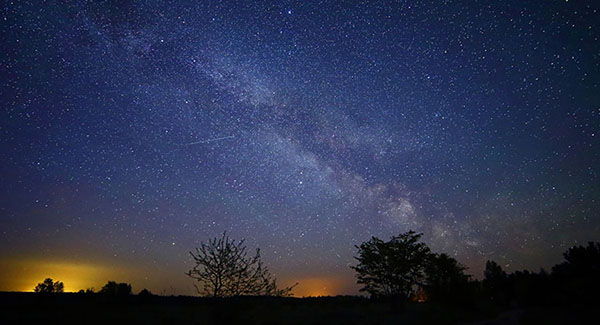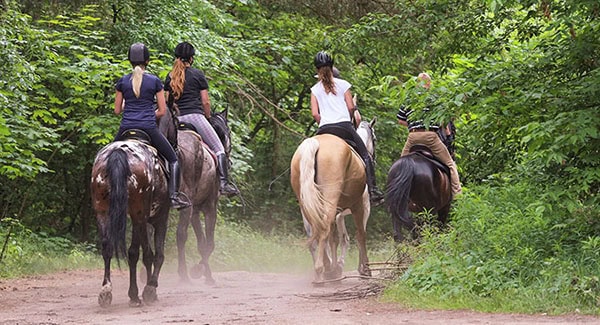
Last Updated on February 20, 2024
Sometimes, if life is feeling too chaotic or overwhelming, it helps to sit back and get a little perspective. Few opportunities offer quite as much perspective as staring into the deep, dark recesses of the night sky and contemplating the full nature of the universe. In addition to its philosophical benefits, stargazing can be very educational, as well.
In much of the country, there is too much light pollution to get the full experience of sitting under a canopy of stars and watching the Milky Way shift overhead. Luckily, in much of Western North Carolina, just a short drive will take you into open spaces and dark skies.
Grab a blanket to sit on, and another to snuggle under. Here are three of the best places we know for stargazing in Brevard, NC.
Graveyard Fields
The first place to go for stargazing in Brevard is the Blue Ridge Parkway. Most overlooks along the Parkway offer spots for parking and enough space to sit and enjoy the view. Half an hour from Brevard, Graveyard Fields offers well-marked hiking trails and two gorgeous waterfalls. There’s also no better place to pick mountaintop blueberries in late summer. At night, Graveyard Fields offers one of the very best places to see the Milky Way in Western North Carolina. Graveyard Fields is a very popular daytime hike, but often clears out in the evening. For your convenience, there is a parking area and pit toilets at the start of the loop.
BRP Milepost: 418.8
Black Balsam Knob
If you’d like your stargazing to be a little more remote, there are plenty of hikes that lead to incredible lookouts. (Just be sure to hit the trail well before sunset and plan a safe return route if you’re not camping for the night.) We recommend the 5.5-mile loop from the popular Devil’s Courthouse overlook to Black Balsam Knob. It’s known as one of the greatest hikes along the Blue Ridge Parkway for its breathtaking and expansive views. For a shorter trek, it’s just a half-mile venture to the summit of Black Balsam Knob from milepost 420 of the Blue Ridge Parkway. Over that distance, you’ll gain approximately 300 feet in elevation before breaking out of the tree cover at 6,000 feet. Because of the elevation, you can expect low light pollution and high visibility for most of the year. There are a few different campsites at the top of the mountain.
BRP Milepost: 420
Pisgah Astronomical Research Institute (PARI)
As a nonprofit education and research center, PARI was established in 1998 to provide hands-on opportunities for a broad cross section of STEM disciplines. Their site in Rosman, however, traces its history back to 1962, when it was an east coast NASA satellite tracking facility. Today, PARI is a protected astronomical site with more than 30 buildings, four radio telescopes, 11 optical telescopes, five weather and atmospheric monitoring stations, and various other instruments and educational features. It’s a little bit of a hike to reach its forested location, but that makes it a prime spot to view the starry sky. They host Private Evening Optical Viewings covering up to four guests, which partner you with a PARI astronomer for a guided journey through the sky.
1 PARI Drive, Rosman | (828) 862-5554 | pari.edu
Tips for stargazing in Brevard, NC
- Wherever you choose to go, you’ll be outside for a while. And you’ll likely be at a higher elevation than in town. No matter the time of year, dress as warmly as you can, especially on your head, hands, and feet.
- If you are joining a structured event, try to arrive a little before sunset. If it’s your first experience, this will give you time to learn the ropes.
- Plan to stay for as little or as long as you want. If the sky is clear, a few people may stay all night. Prepare by bringing snacks and drinks if you will want them. And definitely bring a blanket.
- Turn off your car lights as soon as possible once you arrive. If you are leaving or getting back into the car and your cab lights turn on automatically, give a warning to those around you.
- Don’t use a flashlight unless it has a deep red filter over it so fellow astronomers will not lose their night vision.
- If you’re at a group event, ask other participating participants, hobbyists, and professionals what they are looking at and if you can take a look. Most astronomers love sharing their passion. But whatever you do, don’t turn any knobs on their equipment without asking!



